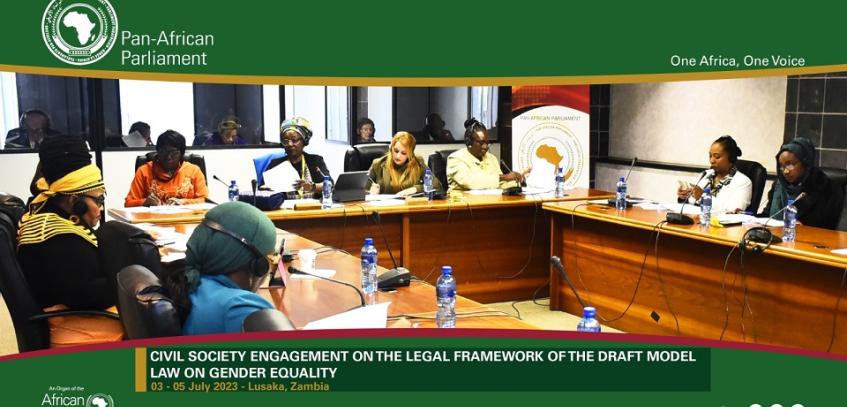The Pan-African Parliament (PAP), through its Permanent Committee on Gender, Family, Youth and People with Disability, is set to embark on a Civil Society Engagement drive as part of the formulation of a Model Law on Gender Equality.
The engagement process begins with Southern Africa-based civil society organisations on 3-5 July 2023 in Lusaka, Zambia. This pilot consultation is held in collaboration with the African Union Economic, Social and Cultural Council (ECOSOCC).
The objective of the consultation with the African citizenry is to ensure that the policy framework on the Model Law on Gender Equality and the draft Model Law itself incorporates the views and aspirations of the people of Africa, in line with the mandate of the Pan-African Parliament.
At the First Ordinary Session of the Sixth Parliament in November 2022, the Pan-African Parliament undertook to make equality a reality in Africa. In doing so, the Parliament, through a Resolution, mandated its Committee on Gender, Family, Youth and People with Disability to pursue a Model Law on Gender Equality in a bid to harmonize continental and regional efforts aimed at closing the gap of gender inequality and achieve the objectives of Agenda 2063 in this area.
This Resolution was taken in the context of the evaluation of the implementation of the African Women’s Decade priority areas, and the realisation that despite the popularisation of the Maputo Protocol on Women’s Rights provisions, women still face numerous challenges to reach equality.
In March 2023, the Committee held initial consultations with various partners in specific areas such as women access to land, education, employment and equal remuneration, social protection, political participation as well as participation in decision-making processes. The consultation sought to enlighten Pan-African Parliamentarians on the existence of international Conventions and studies that have recently been carried out in the framework of promoting gender equality.
The process has now turned to soliciting and gathering inputs from the grassroots populations underpinned by engagement with civil society organizations (CSOs) for public hearings to get their views on the legal framework of the draft Model Law.
Hon. Dao Gabala Mariam, Chairperson of the Pan-African Parliament Committee on Gender, Family, Youth and People with Disability says that this engagement is imperative as it will aid in promoting the Model Law and enable grassroots organizations to partake in Parliament’s and ultimately the African Union decision-making processes.
“The feedback and recommendations gathered through our consultations with civil society will be incorporated into the legal framework of the draft model Law. This process is also anticipated to raise awareness and understanding of the Maputo Protocol and its role in safeguarding women's rights. The engagement is expected to identify the deficiencies in the Maputo Protocol and propose measures to address them in a model law,” said Hon. Dao.
Adopted by the African Union in July 2003, the Maputo Protocol is a legally binding instrument that aims to promote and protect the rights of women in Africa, with a focus on gender equality. The Protocol recognizes that gender equality is essential for the development and well-being of society and seeks to address the inequalities and discrimination that women face in all aspects of their lives. It is thus a significant instrument for promoting and protecting gender equality in Africa.
The pilot Civil Society Engagement in Southern Africa will be followed by consultations with civil society organisations across the rest of the continent. The Pan-African Parliament was established by article 17 of the African Union Constitutive Act, to ensure the full participation of African Peoples in the continent’s development and integration. Its core functions are inter alia, to facilitate the implementation of the African Union policies and objectives; to promote human and people’s rights; to facilitate the harmonization and coordination of the legislative texts of Member States in accordance with Article 11(3) of its Protocol, including those aimed at advancing the rights of women as guaranteed at the international and regional level.








